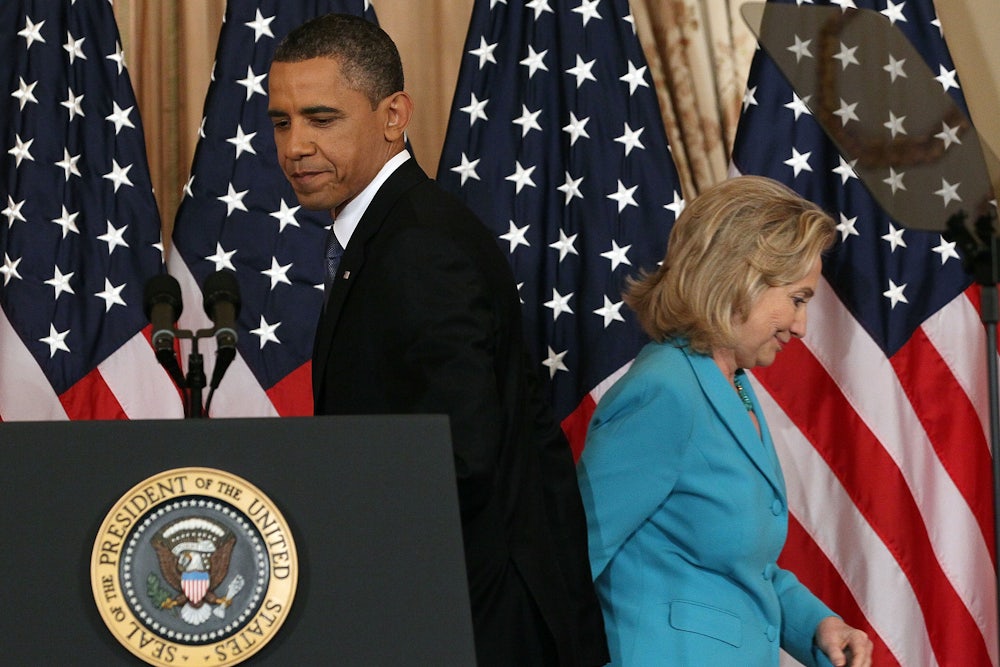In trying to smear Hillary Clinton earlier this month, Newt Gingrich inadvertently revealed the hidden strength of her most powerful surrogate. On Hannity, Gingrich declared, “Hillary is Obama plus corruption.” Although this was certainly not his intention, Gingrich’s formulation pointed to something that is undeniably true: Obama is the Mr. Clean of American politics, having run an administration unusually untarnished by taints of corruption or conflicts of interest. The president’s reputation for probity will be an invaluable asset as he takes to the campaign trail, beginning next Tuesday in Charlotte, North Carolina, to make the case for Clinton—and to help sway voters who distrust her.
Obama’s spotless reputation is all the more remarkable for a president who’s faced a ruthlessly hostile Congress since the 2010 mid-terms, filled with Republicans who would love nothing more than to bring him down. But every attempt to gin up a scandal—ranging from accusations that the IRS targeted conservative groups to denunciations of how the administration handled the Benghazi attack—has fizzled. At worst, these pseudo-scandals have engaged the Republican base, but they’ve had no sway over the larger population. Even when Obama’s general public approval was in the doldrums, as in May of 2015, a majority of Americans still thought he was honest and trustworthy.
The problem Clinton faces is that Donald Trump’s nickname for her—“Crooked Hillary”—echoes the larger suspicions of the public. Earlier this year, a Washington Post/ABC News poll found that just 37 percent of the public found her trustworthy as against 57 percent who didn’t. These dismal numbers are due to the fact that Clinton has received a one-two punch from both Republicans and Democrats. The GOP has long nurtured conspiracy theories against both Bill and Hillary Clinton, going back to wild 1990s accusations about the presidential couple murdering Vince Foster. Trump is doing everything he can to revive these smears. But Bernie Sanders has also helped diminish Clinton’s reputation for trustworthiness with much more grounded and sane questions about her ties to Wall Street. The drumbeat of scandal mongering is likely to increase and some of those stories, like reports of a donor to the Clinton Foundation being appointed to a secret intelligence board, will have a basis in fact.
Given Clinton’s credibility gap, Obama is the essential surrogate. He’s the only Democrat who has won more than 50 percent of the vote in national elections twice in a row since Franklin Roosevelt. He’s broadly popular with the public, with approval ratings at 52 percent. And most crucially, he’s extremely popular with Sanders supporters: 64 percent of them view the president favorably, against only 8 percent who view Clinton favorably.
Obama can serve to heal the wounds of the hard-fought primaries. And as he did in his own campaigns, he can infuse the Clinton campaign with the kind of uplifting message of hope and unity that she struggles to convey.
Obama is uniquely well-positioned to go after Trump’s own trust problem, which looms larger than Clinton’s. Trump lies, routinely, on an epic scale. Trump University has the earmarks of a scam. In his routine business operations, Trump allegedly bilked hundreds of small business owners by not paying them money owed. In sum, Trump is a fraud, and Obama will portray the Republican standard-bearer as little more than a grifter. Because of Obama’s record of probity, these charges will carry a real weight of authority and not be subject to the sort of tu quoque arguments that Clinton would face.
From the White House Press Corps dinner of 2012, we already know that Obama is skilled at mocking Trump in ways that get under the demagogue’s skin. On that occasion, he punctured Trump’s self-regard by comparing the seriousness of governing with the silliness of hosting a reality show. Obama quipped that during a controversy on Celebrity Apprentice, Trump “didn’t blame Lil’ Jon or Meatloaf. You fired Gary Busey. And these are the kind of decisions that would keep me up at night.”
Imagine what Obama can do if his goal is to portray Trump not just as a goofball, but also as a penny-ante con man. At this year’s Press Corp dinner, Obama described Trump as a “guy [who] wanted to give his hotel business a boost and now we are praying that Cleveland makes it through July.”
In the modern political era, only one president—Ronald Reagan—has played as active a role in trying to elect a successor as Obama plans to take over the next five months. According to The New York Times, Obama’s team is planning on having him campaign in largely white suburbs of Ohio and Pennsylvania. This might seem like an odd choice. Why not have Obama energize the demographic among which he’s most popular, African-Americans? The answer is simple: Black voters are already very loyal Democrats and, based on the primaries, very much in Clinton’s camp. White Democrats and independents are much less certain about Clinton, and have leaned towards Sanders.
It’s these wavering and uncertain voters that Obama will hope to sway. And the message he can deliver is clear: Whatever trepidations you have about Clinton should be set aside, because Trump is a sleazy huckster. Coming from a politician as trusted as Obama, it’s a message that will stick, and will be immensely helpful in helping Clinton move past her own credibility problem and keep the focus on Trump’s.
